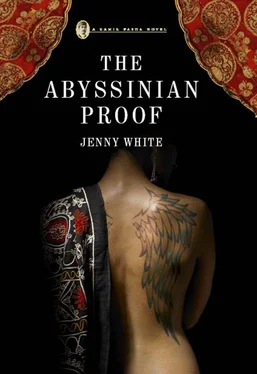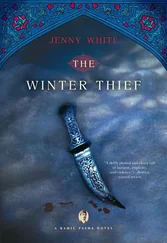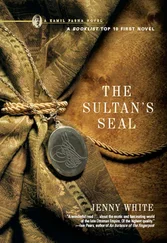Jenny White - The Abyssinian Proof
Здесь есть возможность читать онлайн «Jenny White - The Abyssinian Proof» весь текст электронной книги совершенно бесплатно (целиком полную версию без сокращений). В некоторых случаях можно слушать аудио, скачать через торрент в формате fb2 и присутствует краткое содержание. Жанр: Исторический детектив, на английском языке. Описание произведения, (предисловие) а так же отзывы посетителей доступны на портале библиотеки ЛибКат.
- Название:The Abyssinian Proof
- Автор:
- Жанр:
- Год:неизвестен
- ISBN:нет данных
- Рейтинг книги:4 / 5. Голосов: 1
-
Избранное:Добавить в избранное
- Отзывы:
-
Ваша оценка:
- 80
- 1
- 2
- 3
- 4
- 5
The Abyssinian Proof: краткое содержание, описание и аннотация
Предлагаем к чтению аннотацию, описание, краткое содержание или предисловие (зависит от того, что написал сам автор книги «The Abyssinian Proof»). Если вы не нашли необходимую информацию о книге — напишите в комментариях, мы постараемся отыскать её.
The Abyssinian Proof — читать онлайн бесплатно полную книгу (весь текст) целиком
Ниже представлен текст книги, разбитый по страницам. Система сохранения места последней прочитанной страницы, позволяет с удобством читать онлайн бесплатно книгу «The Abyssinian Proof», без необходимости каждый раз заново искать на чём Вы остановились. Поставьте закладку, и сможете в любой момент перейти на страницу, на которой закончили чтение.
Интервал:
Закладка:
Yakup returned and held out a starched white shirt. The servant was tall and wiry, with high cheekbones and alert, almond-shaped eyes under brows that arched like bows across his forehead. He reminded Kamil of a Seljuk, one of the thirteenth-century Turkish tribesmen whose faces still bore traces of their Asian ancestry. Kamil had seen drawings of them in a collection of miniatures in the library of his friend Ismail Hodja, a learned Sufi sheikh and leader of the Nakshibendi order. Yakup’s father had been a Tatar.
Kamil slipped on the fresh shirt, then picked up a string of amber beads from his desk. “These belonged to my grandfather and probably to his father.” He held them up to the lamp, where the beads glowed like miniature hearths. “If I sold them, I’d probably get only a few kurush for them. But they’re worth more to me than almost anything else I own.”
“I know what you mean, bey,” Yakup responded. “It’s as if when you touch it, your fathers are speaking to you. Like a bell ringing and you can feel the vibration, even if you can’t hear the sound.”
“That’s it exactly. You’re a poet, Yakup.” Kamil laid the beads aside, pulled open the top drawer of his desk, and took out a Colt revolver, a box of bullets, and a holster. He pushed the files aside and placed the revolver on the desk. “Is there anything passed down in your family that speaks to you like that?” He strapped the holster around his waist.
“People like us don’t have a history, pasha,” Yakup responded, using Kamil’s hereditary title.
Kamil stopped and frowned at Yakup. “But your father was a water carrier, wasn’t he? He had a profession like anyone else.” Like Kamil, most Ottomans used only their given names, adding titles and descriptions to separate Ali the Water Carrier from Ali the Pasha, Grocer Ali from Bosnian Ali. Names passed away with their owners; they didn’t accumulate history.
“Great families have histories and their possessions become steeped in them, like baklava in sugar. My father’s water skin, on the other hand, rotted and we threw it away. Almost everything in our house was passed along to other families when our need for it was done. It’s not the same thing, my pasha. That’s how it always was and that’s how it always will be.”
Astonished, Kamil said, “I never knew you were such a fatalist. Come on, Yakup. You don’t really believe that, do you?”
Yakup shrugged, his face betraying only a stolid attentiveness, although Kamil thought his eyes sparkled with repressed humor, perhaps even a trace of mockery.
“Your history, my history, it’s all the same, Yakup,” Kamil said, reaching for the jacket Yakup held out. He picked up the beads and regarded them thoughtfully. “You’re right about possessions soaking up history, though. Every object contains a story about who made it, who owned it, and what happened to it. The older it is, the richer the story.”
“My father always said, ‘For the lean ox, there is no knife.’ If you’re poor, no one can take anything away from you.”
Kamil slipped the beads into his jacket pocket and turned to face Yakup. “Your father came from the Crimea, didn’t he?”
“Twenty-five years ago, after the war with Russia. The Cossacks killed his parents, but they missed me and my mother. After the war, he tried to start over, but they told him his land was owned by Russians now. They suspected him because he was a Muslim and he was afraid they were going to arrest him, so my parents joined some other Tatar families and migrated here. My father wasn’t even religious,” he added. “He just wanted to work.”
“Your parents were very brave.” Kamil pulled on his boots, instinctively checking for the long, slim blade secreted in the shaft of one of them.
Yakup shrugged. “They didn’t have much to leave behind. All their wealth was walking beside them on the road.”
Kamil picked up his revolver and dropped a bullet into the chamber. It made a satisfying click when he rotated it. There was a rap at the entry door and Yakup hurried downstairs to answer it. He reappeared with a gendarme captain, who bowed formally and introduced himself. The soldier was young and held himself with easy confidence.
“Welcome, Captain Arif. What news?” Kamil finished loading his gun and snapped it shut.
“Pasha, we have him,” the captain said, standing at attention.
Kamil slipped the revolver into his holster, and pocketed a leather bag of extra ammunition. “Let’s go then.”
The last stage of the operation slid into place.
The priest stood outside the door of a shabby cottage, in an isolated corner of Balat. The house was wedged between the ruins of a Byzantine foundation and a small brick warehouse that backed onto the water. Across the lane, in the dark recesses of an alley, Kamil watched as the priest embraced a man who was standing inside the darkened entrance, then handed him a basket. When the priest had gone, a light appeared behind the closed shutters. The moon now rode low in the sky and the night was dark enough to conceal the platoon of soldiers surrounding the house. Others would be waiting for the priest at his residence.
Kamil lit a cigarette to keep himself warm, careful to keep the glowing tip hidden within the palm of his hand. Captain Arif came to stand beside him, an immaculate Peabody-Martini repeating rifle slung over his shoulder. Kamil offered him a cigarette.
“I thank you, Magistrate,” Captain Arif said in a low voice. “Perhaps later. My men are in position.”
“Good.” Kamil smoked and thought about the best way to proceed. They had learned that the suspect’s name was Marko and he was a member of a group calling itself the Macedonian Revolutionary Organization. He was fifteen years old.
Kamil glanced at the rifle on the captain’s shoulder, threw down his cigarette, and began to walk across the lane toward the cottage.
The captain chased after him. “What are you doing, pasha?”
“I’m going to talk with him.”
The captain stopped. “What do you mean talk to him?”
“I’m going to reason with him.”
“With all respect, pasha, you don’t know what weapons he has in there.”
“You’re not responsible for me, Captain Arif.” Kamil assured him, “I’m armed.”
The captain didn’t look reassured. “Please, pasha. At least let me go in with you.”
“Stay just outside the door. I’ll call you if I need you.”
The captain nodded reluctantly and whispered instructions to an aide.
Kamil knocked. When there was no answer, he knocked again. He could hear someone moving behind the door.
“Who is it?” The voice was indistinct, but sounded young.
A boy, Kamil thought. They’ve sent an army to capture a boy.
“Marko, my name is Kamil Pasha. I’d like to speak with you. I guarantee that no harm will come to you while I’m with you.”
There was no answer.
“There is no reason for you to die.”
“There’s no reason for me to believe you either,” the voice said. “I’m sure you’re not alone.”
“No, but I’ll come in alone.”
“Why would you do that? Are you trying to prove your bravery?”
“I don’t need to prove my mettle against a boy,” Kamil retorted, annoyed. “I want to talk to you. There’s an army out here. Take your pick.”
Captain Arif was pressed against the side of the wall.
The door cracked open and Kamil could see the shadow of a face beyond it. “I agree that talking is better than dying,” the voice said, closer now. “Come in.”
Kamil pushed through the door and it slammed shut behind him. He flinched away from a light held directly before his eyes. A moment later, the light receded. A dark-haired boy with a tired smile beckoned him into the room.
Читать дальшеИнтервал:
Закладка:
Похожие книги на «The Abyssinian Proof»
Представляем Вашему вниманию похожие книги на «The Abyssinian Proof» списком для выбора. Мы отобрали схожую по названию и смыслу литературу в надежде предоставить читателям больше вариантов отыскать новые, интересные, ещё непрочитанные произведения.
Обсуждение, отзывы о книге «The Abyssinian Proof» и просто собственные мнения читателей. Оставьте ваши комментарии, напишите, что Вы думаете о произведении, его смысле или главных героях. Укажите что конкретно понравилось, а что нет, и почему Вы так считаете.












